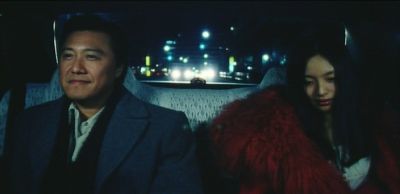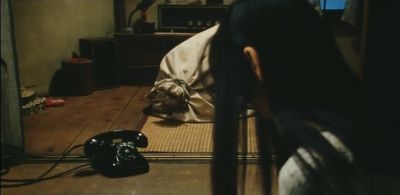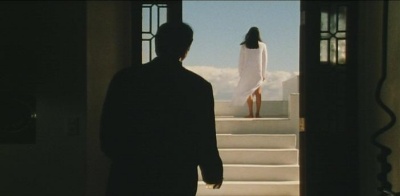Audition
Unexpectedly fantastic romcom / slasher variant.

Takashi Miike may well be the hardest working director around, averaging an astonishing five films a year. His critics may claim this comes at the expense of quality control, but Audition is one of his finest.
The film concerns the plight of a scriptwriter / producer, Shigeharu Aoyama (Ryo Ishibashi). He lives an ordinary life with his teenage son, Shigehiko (Tetsu Sawaki). Those who have experienced Dead Or Alive and Ichi the Killer will probably be in shock at this point; anything 'ordinary' is very much unexpected from Miike's cannon. They can be reassured however, that things do get strange later on.
Aoyama lives with his son, their dog and occasional visits from their housekeeper. Aoyama's wife, Ryoko, had died some years previously, which is the cheery scene we open the film with. Unhappy perhaps, but it's beautifully framed and lit, which is common throughout the film. The score for this scene is particularly touching, especially as a young Shigehiko walks in with a hand-made collage to give to his mother just seconds after she dies.
We rejoin them after a successful fishing trip, having a conversation over the course of which two things are established; Shigehiko knows a lot about trout, and he thinks that it's about time his father thought about remarrying. By this point, you may have noticed another stylistic departure from Miike's other films; fairly long, static shots, compared to his usual hyperkinetic cutaway sequences and wilfully bizarre angles. A case of treatment fitting the material, and it is a great enhancement to the film. For most of the first hour of the film, nothing particularly strange happens, and it works awfully well as a 'normal' film compared to the unusualness Miike generally serves us. I feel it proves a point to some of his critics that Miike could easily direct a conventional narrative based movie, if he felt the urge to. You may at this point draw your own parallels between David Lynch and his The Straight Story / Everything Else He's Ever Done experiment.
Further conversation between Aoyama and his colleague, Yasuhisa Yoshikawa (Jun Kunimura) establishes that Aoyama is indeed getting a little bit lonely, and is ready to start looking for a woman, preferably one with skills. But how can he get back in to the dating game after such an absence? Thankfully Yoshikawa, who happens to be a director, has a fantastic idea - hold an audition for a part in a film. The fact the film doesn't have any funding behind it at the moment is an irrelevance, and at least if they do get the money that part will be done already. The main motive, as you may have already guessed, is to let Aoyama have a read of the prospective actress's resumes and mugshots, and pick up one that he likes the look of. A cunning plan indeed.
The audition is arranged and a radio advert is commissioned for a venture called "Tomorrow Star", looking for fresh new talent, thus pre-dating Popstars by some years. As Aoyama listens to this in his car, we cut to a girl kneeling in dark in front of a phone listening to the same. It's surprising it's taken this long for any oddness to unfold, even if it is only a glimpse into the surreal nightmare the film descends into in the final reel.
While idly leafing through the applications, after a cute touch of turning around a picture of his wife so she doesn't have to bear witness to this, Aoymoto stumbles across the resume of a Ms. Asami Yamazaki (Eihi Shiina). He is intrigued by the covering letter Asami has written, telling of her past as a ballet dancer, cut short due to an injury, saying of this "The greatest hope turns to the greatest disappointment. I feel like a dead person. Live or die, it is just a thin line between them". This moves Aoymoto indeed, for some reason. An unusual phrase with which to find a soul mate, but whatever floats your boat, I suppose. I'd be thinking "This lass is a nut-nut" at this point, were the roles reversed. The phrasing possibly loses something in the translation, as a fair few of the English subtitles in my Region 3 DVD appear to have been mangled by someone with an, er, robust approach to the translation. Thankfully, this never spoils the enjoyment of the film as the intent of the lines seems clear, even if the phrasing is a little unusual. The Tartan Asia Extreme Region 2 release may have a better translation available.

The audition itself is held in a nondescript, brightly lit white room. And we're treated to an unusual and amusing parade of hopefuls, some devoid of character, some clearly imbued with more than is healthy for one person to have. It's all too easy to imagine a short scene like this appearing in any Hollywood romcom (albeit in English, obviously), and again makes the movie feel far more conventional than you may have expected from Miike. After a few long, lingering glances between Asami and Aoymoto, the audition ends and they pack up and go home. Yoshikawa doesn't share Aoymoto's appreciation of Asami, getting the feeling that something isn't quite right. As it turns out, he's absolutely bang on.
Aoymoto steams ahead with his planned seduction, arranging a dinner date. Some of the details Asami gives of her life should set off warnings in any right-thinking person's mind, which should turn into fully formed alarms when Yoshikawa checks out some of the references she was giving out earlier. A record company executive she said she was dealing with hasn't been heard of for a year and a half and the bar she claimed to be working in part time doesn't appear to exist. Aoymoto promises Yoshikawa he'll back off for a while. All this unveils relatively slowly, and does a great job of introducing tension into what was previously a light hearted little romance story. It's built further as Aoymoto tries to resist calling his new-found love, with lots of hovering about near phone handsets and staring longingly at phones. Meanwhile, Asami is doing the same thing. Kneeling in front of the phone, in her dark, squalid flat. Along with a mysterious sack, which was briefly seen in the previous scene of this ilk. Aoymoto eventually breaks and calls her. At which point the sack emits a growl and starts to roll about, which is unusual behaviour for a sack. It certainly gave me a bit of a start first time I saw it, which places it at one more jumpy bit than pretty much every horror movie.
A series of dates is arranged, with more details of Asami's troubled past being arranged. Aoymoto finds this openness endearing; at this point we find it creepy. It attempts to build up some sympathy for Asami through her admittedly tragic past, but spoils it somewhat by cutting back to the scary sack at intervals. The inherent creepiness of this is great for building tension and intrigue, but less effective in humanising Asami in any detail above that which has gone before it.
Aoymoto takes her to a seaside retreat, with the intent of proposing. Before he can realise this ambition, Asami strips and hops into bed, asking Aoymoto to look at some nasty scars on her body before the relationship progresses any further. She says that they came from burns sustained during childhood. This doesn't phase Aoymoto, probably because love is blind, like justice and Helen Keller. Before they consummate the relationship, Asami asks of Aoymoto "I want you to love me only". And now we're definitely approaching Fatal Attraction bunny-boiling territory. When Aoymoto awakes, he is alone.
Understandably upset, he tries to track her down. Aoymoto approaches Asami's old ballet school, breaking through the boarded up door. And it's at this point the film breaks free of the conventional into the surreal nightmares Miike is notorious for. A chap in a wheelchair, Mr. Shimoda is inside playing the piano in yet another gorgeously lit scene, in shades of red and orange streaming through the window. We are 'treated' to a shocking scene of Shimoda burning a young Asami with red hot pokers, which is grotesque, yet merely a shade of things to come.
Tracking down the bar Asami claimed to work in yields little success as it has been shut for some time, after the grizzly murder of the owner. A passer-by informs Aoymoto of the discovery of the body, as well as an extra ear, three fingers and tongue. Cue Aoymoto's vision of tongues flapping around on the floor. Having had an unusual and quite stressful day to this point, Aoymoto goes home. Having a relaxing drink proves to be a bad idea, as it relaxes him all the way to the floor, Asami having broken in previously to slip the proverbial mickey to the bottle.

At this point conventional narrative packs it's bags and leaves in a huffy fit, as the film bounces around between visions of Asami's childhood, occasionally replacing the child Asami with the adult version, with Aoymoto's deceased wife appearing randomly at points. We jump back to previous dates, again with a changing and random cast of people, as well as giving us the final revelation of what's inside the sack as well as a charming piano wire garrotting / decapitation scene. Parts of this are devoted to trying to show us how her previous experiences have made Asami this way, but there's too much bizzareness happening as well for it to be truly effective in this. It almost ruins itself by hinting at a cop-out J.R stepping out of shower style dream sequence ending, but instead finishes with a hugely disturbing 15 minute torture scene as Asami takes out her frustrations on Aoymoto, on account of his lying about the initial audition, and lying about only loving her, as her clearly loves his son too.
A large portion of the criticism that Miike has collected for his works throughout the years concerns the whole 'style over substance' idea. I don't feel that's a tremendously valid argument in this film. I won't argue that this film oozes style, with hugely atmospheric lighting and framing of certain scenes. The acting is above par from all concerned, with a real warmth established between Ishibashi and Sawaki despite limited screentime. Asami's brand of dispassionate insanity is played well by Shiina.
Does the film have a message? Should it? It could be argued that it's a very extreme morality tale; that any deception no matter how innocent could come back to haunt you. In this case it would appear to have run through the karma multiplier. Maybe Miike just agrees with Schopenhauer that life without pain is meaningless. Aoymoto certainly has a life full of meaning by the end of the film. If the film suffers from anything it's the fairly sudden change from 'slightly off-beat but generally conventional' to 'mad as a door' that occurs late on; it's going to throw a lot of people off kilter if they were expecting Fatal Attraction - Special Nippon Edition. If you like thing to have nice conventional beginning / middle / end structures and a nice sensible resolution you may feel let down by the final half-hour, it was all going so normally until that point. However, if you can appreciate an attempt to tell a fairly well-worn story in an original fashion, and aren't squeamish, Audition should prove a breath of fresh air.
Were I in the business of passing quantifiable judgements, I'd award this 5/5 TippyMarks. Certainly won't be everyone's cup of Darjeeling though.
DVD Notes :- This was reviewed off the region 3 Universe release. The quality of the subtitles I've mentioned, slightly suspect but nothing to worry about when the film can be had from Hivizone for five and a half U.S. dollars.
It has a nice transfer all round, although not anamorphic and only in 2.0 stereo. This doesn't really affect this type of movie though. The only extra over the expected subtitles is the trailer, which doesn't really count.
Eihi Shiina (Asami Yamazaki)
Tetsu Sawaki (Shigehiko Aoyama)
Jun Kunimura (Yasuhisa Yoshikawa)